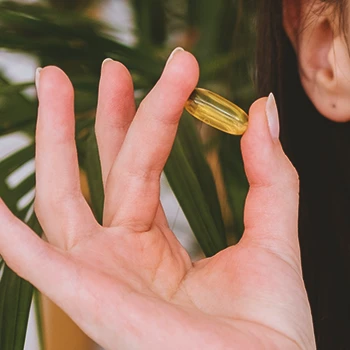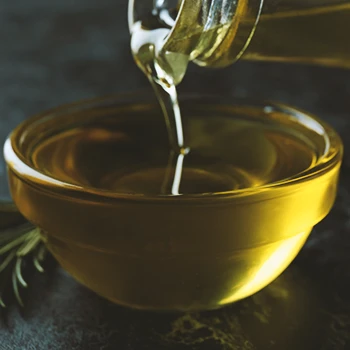As a seasoned fitness trainer, I sometimes experience a lack of mental and physical vitality during my workout.
I found that a lack of testosterone in the body can lead to a decrease in strength and cause brain fog and, thus, an absence of focus. I consulted with my dietitian, who recommended vitamin E as a remedy, so I decided to test it.
In this vitamin E review, I will discuss its benefits and whether it can increase testosterone levels.
Keep on reading.
Quick Summary
- Vitamin E aids in the production of steroid hormones like testosterone.
- Other benefits of Vitamin E include boosting eyesight, enhancing the skin's health, and boosting your immune system.
- It's highlighted that Vitamin E can be essential for increasing sexual desire and mitigating erectile dysfunction due to its antioxidant properties and role in sex hormone production.
- From a personal perspective, the article suggests that while natural Vitamin E can boost testosterone, the amount ingested through diet is hard to calculate, and excessive consumption may have adverse effects.
Why Is Vitamin E Important?

The National Library of Medicine, E vitamins benefit eyesight, the immune system, fertility, and the wellness of your blood, skin, and brain [1].
It contains antioxidant effects as well. Antioxidants are compounds that may safeguard your cells from the impacts of free radicals, molecules created by your body when it digests food or is subjected to smoking or radiation [2].
However, if you employ vitamin E supplementation for its antioxidant characteristics, know that it may not provide the same benefits as natural antioxidants in food.
Effect of Vitamin E on Testosterone

Vitamin E aids in creating steroid hormones such as luteinizing hormone and testosterone [3].
As a result, the more testosterone-boosting vitamins you take, the more likely you will get increased testosterone levels.
In the same way, the more testosterone you have, the greater your muscle mass and physical power.
Our bodies require polyunsaturated fatty acids (PUFA), good fats.
Polyunsaturated fatty acids (PUFA) are essential for heart health and overall well-being and are common in our diet.
That said, these fats are easily contaminated in the body by a process called lipid peroxidation, hence forming reactive oxygen species (ROS).
A research gate study mentions that this leads to testicular tissue damage, which increases the stress hormone cortisol, reducing testosterone levels and the risk of producing free radicals that damage tissues and cells [4] [5].
"Because of their numerous unsaturated bonds, PUFAs are highly prone to oxidation when compared to other fats, a health-destroying activity that the body generally reduces with a fat-soluble vitamin, an antioxidant called E vitamin."
– Laurel Matthews, M.D.
Vitamin E and Athletic Performance

Research from the National Library shows vitamin E, as an antioxidant, can reduce exercise-induced oxidative damage, benefiting athletes [6].
E vitamins benefit athletes since they are antioxidants that may aid in reducing some of the oxidative harm caused by exercise.
Excess free radicals cause this oxidative harm, which may cause cellular damage, leading to muscle cramps and the inability to complete a workout.
However, consuming vitamin E helps neutralize these radicals, thus preventing damage [7].
After using E vitamin supplementation for a month, I felt a boost in energy, and my exercise performance improved.
Though the effects are subtle, I can now push harder at the gym and for longer periods.
Vitamin E and Libido
This supplemental vitamin is essential for increasing a man's sexual desire and mitigating erectile dysfunction due to its potent fat-soluble antioxidant and testosterone-protective properties.
It aids in creating sex hormones, which are key factors directly influencing your sex drive. With that in mind, it's been demonstrated to promote libido by boosting the amount of circulating testosterone in the body [8].
Food Sources and Dosage

A testosterone-boosting diet includes vitamin E-rich foods like vegetable oils, eggs, nuts, and whole grains.
That said, the body requires 15 mg of the vitamin daily for both men and women.
I usually cook my meals with avocado oils to ensure I get enough natural E vitamins. Also, I mostly eat beef liver and eggs before workouts.
Also I always suggest the following supplements to my clients:
Related: How to Boost Testosterone in Women Naturally?
How Vitamin E affects Testosterone
Vitamin E's effect on testosterone varies depending on the form of testosterone.
For example, it may have a more significant impact on free testosterone, which is bioavailable and active in the body. It might also influence Sex Hormone Binding Globulin (SHBG) levels, affecting free and bound testosterone balance.
FAQs
Is Vitamin E Good for Low Testosterone?
Yes, vitamin E is good for low testosterone. It contains antioxidant characteristics that safeguard the testicular tissues from free radical impacts, thus increasing the production of testosterone.
What Vitamins Help Produce Testosterone?
The vitamins that help produce testosterone are B3, B9, C, D3, and E.
How Much Vitamin E Should a Man Take?
The daily recommended vitamin E intake is 15 mg for anyone 14 or older, including pregnant women.
What Happens if You Take Vitamin E Every Day?
Taking vitamin E every day reduces the markers of oxidative stress leading to an increase in testosterone levels and improved eyesight and skin.
References:
- https://www.ncbi.nlm.nih.gov/pmc/articles/PMC3997530/
- https://www.ncbi.nlm.nih.gov/pmc/articles/PMC3249911/
- https://pubmed.ncbi.nlm.nih.gov/6816576/
- https://www.researchgate.net/publication/286922930
- https://pubmed.ncbi.nlm.nih.gov/23557727/
- https://www.ncbi.nlm.nih.gov/pmc/articles/PMC7697466/
- https://www.ncbi.nlm.nih.gov/pmc/articles/PMC3614697/
- https://pubmed.ncbi.nlm.nih.gov/32893745/
About The Author
You May Also Like






